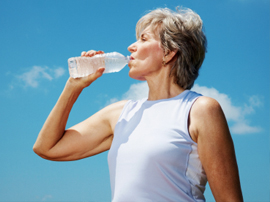Hot weather can give you a Heart Attack. With the heat wave that has been hitting most of the country continues to rise consequences of hot weather can kill, especially because it can result in heart-related problems, says top cardiologist Dr. Chauncey Crandall.
Hot Weather Can Give You a Heart Attack
According to the American Heart Association, heart attack deaths peak not only in the winter, but in the heat of summer as well. This does not surprise Dr. Crandall, who often sees patients with heart problems that have been triggered by the heat.
“When the body is overheated, hyperthermia can result,” he said, describing a condition in which the body’s core becomes overheated. “This condition, coupled with dehydration, results in an electrolyte imbalance and, as a result, people can go into cardiogenic shock,” he said.
In cardiogenic shock, the heart becomes suddenly weak and cannot pump enough blood to the rest of body. “This can cause a multi-organ failure that can trigger a heart attack or sudden cardiac death,” said Dr. Crandall, chief of the cardiac transplant program at the world-renowned Palm Beach Cardiovascular Clinic in Palm Beach County, Fla.
“Have you ever put an egg on a hot pan? It fries. That can happen to the brain, the heart, and the rest of the body. It just fries. This is tragic, because heat-related deaths are very preventable,” Dr. Crandall noted.
Those who are particularly vulnerable are people who are not accustomed to extreme heat, such as those in northern states.
Certain age groups are also at higher risk, he noted. “Elderly people have lost the ability to cool their body down. The sweat glands they had when they were younger have dried up, so the ability their bodies had to maintain an ideal body core temperature doesn’t work as well as it did when they were younger.”
According to the Centers for Disease Control, excessive heat caused the deaths of 8,015 people between 1979 and 2003, the last year for which statistics are available. This tally was higher than those who lost their lives from hurricanes, lightning, floods, and earthquakes combined.
The recent heat wave, which saw temperatures hovering in the 100s for days at a time in many places, was fatal to dozens of people. The victims ranged in age from infants to people in their 90s.
According to Dr. Crandall, one of the biggest dangers of hot temperatures is dehydration. This loss in body fluid can result in the life-threatening heartbeat irregularity known as atrial fibrillation, he noted. A number of studies have found that hot weather increases the risk of heart attack. Heart patients should take special care to stay in a cool environment during hot weather.
Another danger is that extreme heat causes the blood vessels to widen, as the body attempts to rush blood to the surface in an attempt to cool down. This is especially dangerous for people who take common medications such as blood pressure drugs. “They can pass out. We see this all the time,” Dr. Crandall said.
Heat Stroke Symptoms – What To Look For
The problems can culminate in heat stroke, and the symptoms include the following:
- Lack of sweating, with the skin feeling hot and dry to the touch
- Nausea and vomiting
- Flushed or reddened skin
- Rapid breathing
- Racing heart rate
- Headache
- Muscle cramps or weakness
- Loss of consciousness
Heat Cramps
Heat cramps are often among the first symptoms, and they usually occur in the arms, legs and stomach. If untreated, heat exhaustion occurs next, resulting in headache, dizziness or lightheadedness, nausea, and skin that feels cool and moist. If these symptoms are not addressed, the condition can progress to life-threatening heat stroke.
“One of the most important things to recognize about heat stroke, and other heat-related problems, is that they are avoidable,” says Dr. Crandall.
- Here are Dr. Crandall’s safety tips for hot weather:
- Wear light fitting breathable clothing.
- Make sure you are well hydrated. Drink one to three cups of water before heading outside, and then continue drinking water at 20-minute intervals, even if you are not aware that you are thirsty.
- If you are on high blood pressure or heart medications, remember that you may feel the effects of heat more keenly and take extra precautions. Also ask your doctor if they need adjusting.
- Wear well-ventilated shoes and socks.
- Wear a wide-brimmed hat.
- Avoid alcohol and caffeinated drinks, as they pull water out of the body.
- Be cautious walking or exercising in the heat; stick to shady areas when possible.
- Avoid the sun between noon and 3 p.m., when it’s the most intense.
- If you have pets, make sure you protect them from the heat as well.
Read more: Hot Weather Can Give You a Heart Attack.
Important: Are You At Risk For A Heart Attack? Find Out Now.

